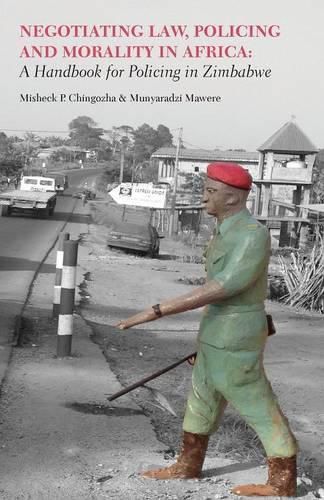Readings Newsletter
Become a Readings Member to make your shopping experience even easier.
Sign in or sign up for free!
You’re not far away from qualifying for FREE standard shipping within Australia
You’ve qualified for FREE standard shipping within Australia
The cart is loading…






This title is printed to order. This book may have been self-published. If so, we cannot guarantee the quality of the content. In the main most books will have gone through the editing process however some may not. We therefore suggest that you be aware of this before ordering this book. If in doubt check either the author or publisher’s details as we are unable to accept any returns unless they are faulty. Please contact us if you have any questions.
The relationship between police and the public in formerly colonised countries of Africa has never been smooth. It is plagued with cliches of suspicion, mistrust, and brutality which are all a result of the legacy of draconian policing in colonial Africa. This colonial hangover has chiefly been an upshot of sluggish switching from the mantra of colonial policing to community progressive policing advocated in democratic societies. This book, the result of five years of ethnographic and library research on the interaction and relationships between police and members of the public in Zimbabwe, is a clarion call for a generative progressive working together between the police and the public for a peaceful and orderly society. While it traces the historical trends and nature of policing in Africa and in particular Zimbabwe, the book demonstrates how law, morality and policing enrich one another. The book offers critical insights in the interpretation of contemporary policing in Zimbabwe with a view to inform and draw lessons for both police and the public. It should be of interest not only to legal anthropologists but also political scientists, members of the public, police instructors, police officers, and students and educators in academic disciplines such as criminal justice, criminology, law, sociology, African studies, and leadership and conflict management.
$9.00 standard shipping within Australia
FREE standard shipping within Australia for orders over $100.00
Express & International shipping calculated at checkout
This title is printed to order. This book may have been self-published. If so, we cannot guarantee the quality of the content. In the main most books will have gone through the editing process however some may not. We therefore suggest that you be aware of this before ordering this book. If in doubt check either the author or publisher’s details as we are unable to accept any returns unless they are faulty. Please contact us if you have any questions.
The relationship between police and the public in formerly colonised countries of Africa has never been smooth. It is plagued with cliches of suspicion, mistrust, and brutality which are all a result of the legacy of draconian policing in colonial Africa. This colonial hangover has chiefly been an upshot of sluggish switching from the mantra of colonial policing to community progressive policing advocated in democratic societies. This book, the result of five years of ethnographic and library research on the interaction and relationships between police and members of the public in Zimbabwe, is a clarion call for a generative progressive working together between the police and the public for a peaceful and orderly society. While it traces the historical trends and nature of policing in Africa and in particular Zimbabwe, the book demonstrates how law, morality and policing enrich one another. The book offers critical insights in the interpretation of contemporary policing in Zimbabwe with a view to inform and draw lessons for both police and the public. It should be of interest not only to legal anthropologists but also political scientists, members of the public, police instructors, police officers, and students and educators in academic disciplines such as criminal justice, criminology, law, sociology, African studies, and leadership and conflict management.